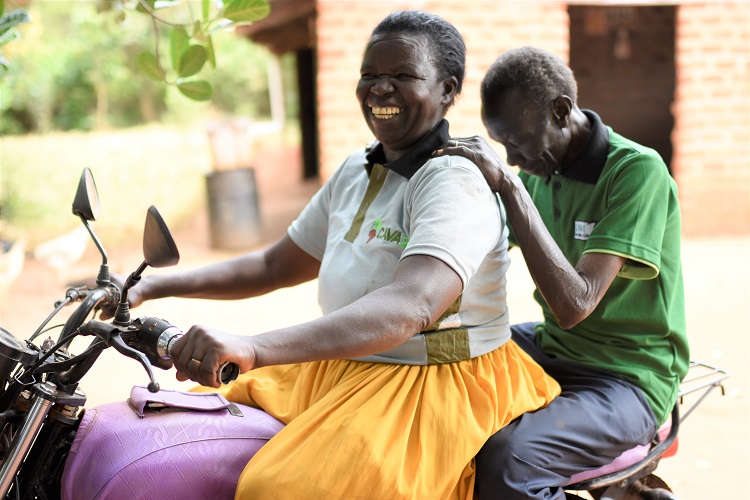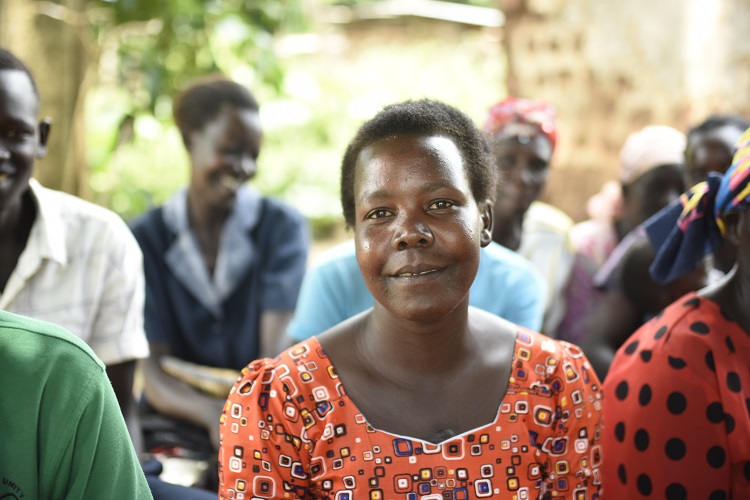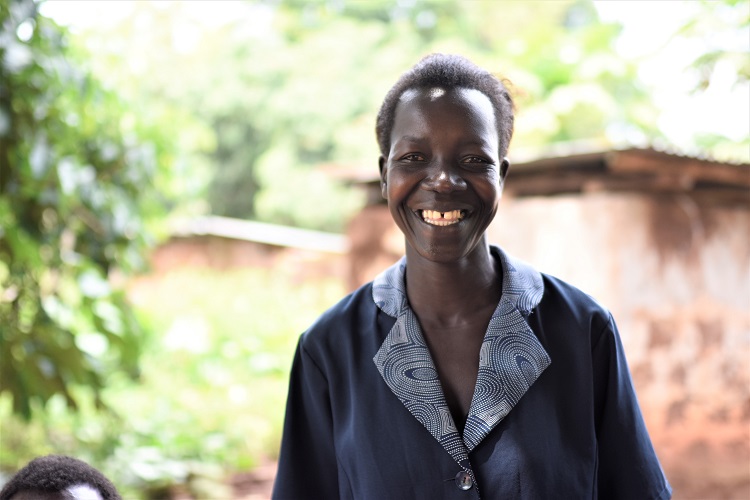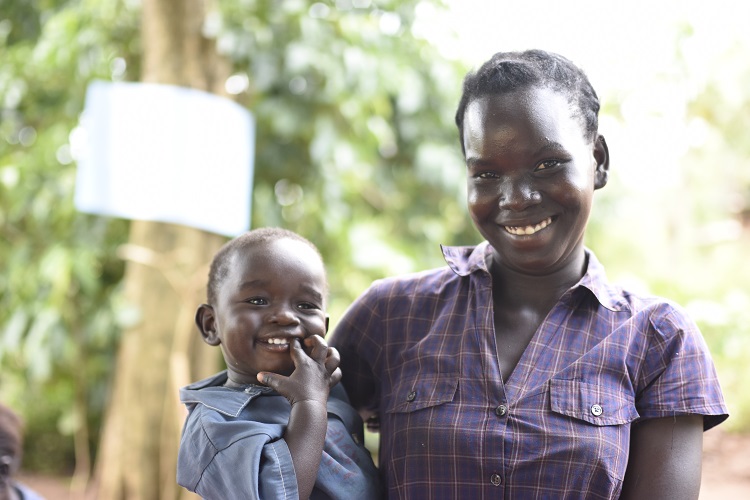There is a place called Ajaligado, in a parish called Ayal, in Alito sub-county, Kole District, in northern Uganda. On the day of our visit, about 25 members of the ‘Alito Cassava Growers’ Association’, met under the trees beside their cassava fields and next to their processing station, to talk to us about their experiences. There were fifteen men and nine women.
 Formed in 2014, the Alito Growers are supported by the Africa Innovations Institute (AfrII) through CAVA2, who have trained group members in good agronomic practices, seed multiplication, and cassava processing, to make value-added products such as high-quality cassava chips. The chips are then processed into flour at a local mill. The CAVA Uganda team has also helped the group to access improved cassava varieties including NASE14, NASE19 and NAROCASS1, and facilitated the purchase of equipment, including a chipper and raised metal drying racks.
Formed in 2014, the Alito Growers are supported by the Africa Innovations Institute (AfrII) through CAVA2, who have trained group members in good agronomic practices, seed multiplication, and cassava processing, to make value-added products such as high-quality cassava chips. The chips are then processed into flour at a local mill. The CAVA Uganda team has also helped the group to access improved cassava varieties including NASE14, NASE19 and NAROCASS1, and facilitated the purchase of equipment, including a chipper and raised metal drying racks.
The group’s leader, Victor Awuco, gave the formal introduction, with all the necessary, dates, names and details. “This year, we got 1.3 million profit (Ugandan Shillings). With that profit, we have been able to get more land, for more, better yield. We have been able to send our children to school. I sent my grandson to the University. And other girls, especially the girls, we have sent them to secondary school. One or two are soon joining university, all from cassava yield.”
Then it was his wife, Phoebe’s, turn. “Our guest of honour, my sweetheart has talked a lot,” she began. The audience erupted into unavoidable giggles. It was easy to feel that here was a woman who commanded respect and knew how to hold her own in front of a crowd. “In front of you here, I’m a woman who is 65 years. As the result of CAVA, you are now seeing me young like you!” Again, the audience burst into laughter. With good humour, the speaker continued, undeterred, “Alito Cassava Growers’ Association, we also formed another group, YALA: Youth Leadership Agriculture in Africa. That’s why you’ve come to Alito because you have seen some of the members are young.”
Phoebe told us about further training they had received through CAVA, “they trained us in postharvest handling and record keeping. You can see how we are selling our cassava flour. And they also trained us in business. We sell our high-quality cassava flour at 1500 a kilo. If it is not quality, they sell at 500 a kilo. This is the work of AfrII and CAVA and it is now becoming sweeter and sweeter.” As spokesperson for the group, Phoebe delivered her message, “We are requesting you as you come here, to give us some 20 years for our youth here. We want to not stop in CAVA2, we want you to expand to CAVA15 and 20. We want to take you to our demonstration, in which the youth demonstrate their NAROCASS1.”
Just as the young people began to stand up and tell their stories for themselves, Phoebe remembered one last vital point, “I want to give you some information. As the result of CAVA2, I’ve bought, me as a woman, I bought that vehicle to transport me to a nearby market, to look for the cassava flour.” She proudly indicated a motorcycle behind the trees. “I think it is good for you to snap my photo when I’m on my vehicle!” This vehicle allows them to sell their stems and cassava flour in the market and purchase other household requirements.
Of six speakers in total, three women got up to speak, sharing their experiences of CAVA2, learning to grow and process cassava into a valued-added product, and the benefits this has brought them:
Adero Catherine: “What we are getting from CAVA2 and AfrII is very good now I’ve joined. After getting the training from AfrII, I’ve planted two acres of cassava. I’m very proud of that and I expect to get about 2 million.” Catherine, 32, is married to Aroma Jasper, 35. They have five children and are looking to expand their cassava gardens.
May Angom, 30, has three children. “I’ve got new knowledge of planting cassava. I’ve grown two and a half acres of cassava; they’re now doing very well. I want 3 million. I hope next year to pay the fees for my children. At the same time, I hope to build the permanent buildings for the parents. I am begging the same of the youth, so that they do likewise and plant more cassava.”
 Akullu Semmy: “I am 20 years old. This is the first born (presenting the baby in her arms). I started growing cassava this year from the elders. I would like from the cassava grown to get something very good. The crops are doing very well. Next year, I’m going to send this child to school. I’m expecting about 4 million or more, because they are doing very well. Thank you from the youth.”
Akullu Semmy: “I am 20 years old. This is the first born (presenting the baby in her arms). I started growing cassava this year from the elders. I would like from the cassava grown to get something very good. The crops are doing very well. Next year, I’m going to send this child to school. I’m expecting about 4 million or more, because they are doing very well. Thank you from the youth.”
Phoebe’s conclusion was clear, “As I told you that I’m now becoming old, I want to end my journey and hand over to the youth. That’s why I’m requesting you to add more years to AfrII and CAVA to be with us. I want to give all the things to the youth, because this time is their future. I say this for good of my country.”
The CAVA2 project ran from 2014–2019 with the aim of improving the lives of smallholder farmers across five countries in Africa: Nigeria, Ghana, Uganda, Tanzania and Malawi. Supported by the Bill & Melinda Gates Foundation, CAVA2 was led by Nigeria’s Federal University of Agriculture, Abeokuta (FUNAAB) and NRI. The project’s focus was to develop the value chains of cassava, the tropical root crop that’s a staple food for millions of people across Africa. Once harvested, the crop needs to be processed quickly, for fresh cassava roots begin to deteriorate 72 hours after harvest. Other challenges include increasing yield, managing pests and diseases, and transporting the bulky roots by road.

